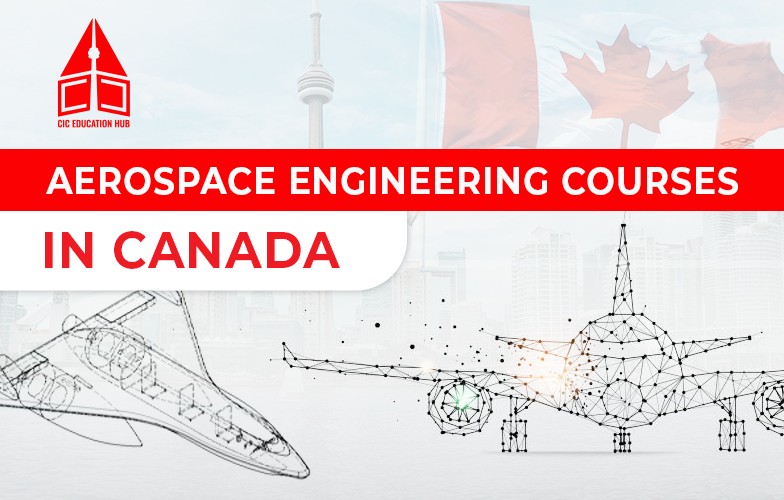Aerospace Engineering Courses in Canada for International Students

Dealing with Aircraft and Spaceship design and construction can be a fascinating profession. Many students want to study aerospace engineering courses in Canada from all around the world. However, due to a lack of sufficient guidance, they end up making the wrong decision for their career.
So, if you want to enroll in Aerospace engineering courses in Canada in 2024
and know everything about it, then probably this blog is for you.
- What is Aerospace Engineering?
- Why study Aerospace Engineering Courses in Canada? Top Benefits
- What is the difference between Aerospace and Aeronautical Engineering?
- Aerospace Engineering Courses Admission Requirements in Canada for International Students
- Top Universities for Aerospace Engineering in Canada for International Students
- Aerospace Engineering in Canada at McGill University
- Aerospace Engineering in Canada at Centennial University
- Aerospace Engineering in Canada at Fanshawe College
- Aerospace Engineering in Canada at The University of Toronto
- Aerospace Engineering in Canada at York University
- Aerospace Engineering in Canada at University of Manitoba
- Job Prospects after Studying Aerospace Engineering Courses in Canada for International Students
- Conclusion: Study Aerospace Engineering in Canada for International Students
- FAQs on Study Aerospace Engineering in Canada for International Students
What is Aerospace Engineering?
Aerospace engineering is one of the major branches of engineering that is concerned with the design, construction, experimenting, and distribution of airplanes, spaceships, and their associated parts.
It has been divided into two major components: Aeronautical engineering and Astronautical engineering. Aeronautical engineering is concerned with the design and building of airplanes and other aircraft that fly within the atmosphere. Astronautical engineering, on the other hand, is concerned with the development and building of spaceships and other spacecraft.
The following are some of the key concepts addressed in Aerospace Engineering courses in Canada:
- Aerodynamics
- Flight Mechanics
- Aerospace Propulsion
- Incompressible Fluid Mechanics
- Aerospace Structural Mechanics
- Introduction to Aerospace Engineering
- Aircraft Design
- Spaceflight Mechanics
- Aircraft Propulsion
- Thermodynamics and Propulsion
Why study Aerospace Engineering Courses in Canada? Top Benefits

Is aerospace engineering even worth it? Why enroll in Aerospace engineering courses in Canada? These questions might arise in your thoughts at least once if you want to explore your career in an Aerospace Engineering field. Here are some of the reasons why you should study Aerospace engineering courses in Canada if you are an International student:
- Infinite Scope. Aerospace Engineering, like the endless universe, has an infinite scope, as all major countries across the world have large space exploration programs. This means that new rocket technologies, space stations, propulsion systems, and hardware are yet to come.
- High Remuneration. The remuneration for Aerospace Engineers in Canada is rising year after year due to the shortage of skills in the Aerospace engineering sector. Employers are willing to hire international students graduating from Canadian Institutions as well. When you enroll in a decent aerospace engineering course in Canada, chances are huge to land a high-paying job soon after completing the course.
- Safe and Friendly Environment. In 2016, the Institute of Economics and Peace ranked Canada as the 8th most peaceful country on the planet. Canadian laws ensure its citizens, irrespective of circumstances, are protected from all forms of discrimination (gender, age, color, religion, and physical disabilities), which means you can put on any religion-based outfits inside the country and in college territory.
- Part-time Jobs. For the “Work, while you study” part, full-time students are eligible to work up to 20 hours a week with a minimum wage of 18$/hour. During summer vacation and scheduled breaks, they can work full-time up to 30 hours a week without a work permit.
- Research Centric. Canadian universities are well-known for their outstanding research. The Aerospace Engineering program includes a curriculum that requires students to conduct numerous research projects, and international students have the option to participate in exciting projects and experiments. That is why Students in Canada have a spectacular study experience with innovation and research.
What is the difference between Aerospace and Aeronautical Engineering?
The domain of Aerospace Engineering is more comprehensive as compared to Aeronautical Engineering. Aerospace engineers have developed advanced technologies that are applicable in aviation, defense systems, and spacecraft. Aerospace engineering concentrates on designing both aircraft and spacecraft. Aeronautical Engineering, on the other hand, is the study of aircraft that operate within the earth’s atmosphere only.
Whether you take aerospace or aeronautical engineering, there are some definite topics standard for both grades like dynamics, propulsion, fluid mechanics, and so on. However, aerospace engineering is the superset of aeronautical engineering, and aeronautical engineering is a subdivision of it.
No matter which branch you choose, it depends on your career path. If you are passionate about the space industry, it is better to choose a course in Aerospace Engineering. If you are interested in working in the commercial aircraft industry, it is better to choose Aeronautical Engineering.
Aerospace Engineering Courses Admission Requirements in Canada for International Students

Before you enroll in Aerospace Engineering Courses in Canada, there are certain Eligibility criteria and Documents needed for both undergraduates and graduates for Visa Processing which are mentioned below:
Eligibility Criteria for Aerospace Engineering in Canada for International Students
- For undergraduate courses, firstly, students must have completed 10+2 with an average of at least 75-80%. English, calculus, physics, and chemistry.
- For postgraduate acceptance, students must have finished their bachelor’s from a well-known university and also must have work experience of 2-3 years in the related domain.
- GMAT or GRE scores are needed.
- Decent English Proficiency Tests: IELTS, C1 Advanced, TOEFL.
- A recent CV (if needed).
Documents Required for Aerospace Engineering Courses in Canada
The following are the documents required for Aerospace Engineering Courses in Canada for International Students:
- Letter of Acceptance
- Statement of Purpose (SOP) & Recommendation Letter
- Valid Passport
- Transcripts/Marksheets
- School Leaving Certificate
- Proof of your English or French Proficiency Test
Top Universities for Aerospace Engineering in Canada for International Students
There are many universities that offer Aerospace Engineering courses in Canada. Here is the list of Universities and links to their website from where you can apply:
- McGill University
- Centennial University
- Fanshawe University
- University of Toronto
- York University
- University of Manitoba
Aerospace Engineering in Canada at McGill University
McGill University has a Minor Aerospace Engineering program Aerospace Engineering at McGill Institute for Aerospace Engineering (MIAE). This Bachelor’s degree provides you the option to participate in a capstone aeronautical design project in the final year of the program, which is given in partnership with local aerospace businesses.
If you’re looking for a college in Canada that offers a research-based aerospace engineering degree, McGill Institute for Aerospace Engineering (MIAE) is the place to go.
Aeronautics and space engineering, avionics and control, aerospace materials and structures, and virtual environment are the four areas in which students might specialize at McGill University.
In addition, for international students, the tuition fee is 45,656.40 whereas, Students in Quebec pay $2,544 while the rest of Canada pays $7,940.
Click the link McGill University for getting more info.
Aerospace Engineering in Canada at Centennial University
Centennial University is another Canadian university that provides Aerospace Engineering. It covers statics, dynamics, material strength, fluid mechanics, and aerodynamics, among other aspects of aerospace engineering.
Aircraft Manufacturing Operations, Aerospace Systems, and Unmanned Aerial Vehicle (UAV) technology are all included in this advanced diploma program. AMET (AEROSPACE MANUFACTURING ENGINEERING TECHNICIAN) certification is also available. Their annual tuition fee is $12,204.
You can check out Centennial College for more info.
Aerospace Engineering in Canada at Fanshawe College
All of the Aerospace engineering courses in Canada provided by Fanshawe University are one-year certificate programs: Composites and Advanced Materials Aerospace Manufacturing (CAMAM) and Applied Aerospace Manufacturing (AAM) are two of them (AAM).
The AAM will give students the particular information and skills they’ll need for a future in aircraft maintenance and repair, while the CAMAM curriculum will emphasize quality assurance, safety, evaluation, and control procedures.
For more info, you can go through Fanshawe College.
Aerospace Engineering in Canada at The University of Toronto
The University of Toronto is a research-based university with three colleges located in Mississauga, Toronto, and Scarborough. Students interested in Aerospace Engineering Courses in Canada can apply for Master of Applied Science, M.Eng., and Ph.D. degrees.
Besides that, Aircraft Flight Systems and Control, Computational Fluid Dynamics, Aerodynamic Shape Optimization, Multidisciplinary Aircraft Optimization, and Spacecraft Dynamics and Control are some of the research fields at this University. Plus, you can also look at Aerospace Science and Engineering, for which one has to enroll in the four-year undergraduate Engineering Science program.
You can click The University of Toronto to get to know more about it.
Aerospace Engineering in Canada at York University
York University offers space engineering to undergraduate students. The Space Engineering program of Lassonde School of Engineering will qualify students with the technical mastery needed to design resolutions to Earth’s problems using space-related assets while utilizing the principles of systems engineering.
Students will also gain professional knowledge of space agencies in complex configurations. Some of the career paths after completing the Space Engineering program include Mission Systems Engineer, Payload System Engineer, Satellite Engineer, Space Agencies Specialist, Telecommunications Developer, and so on.
For more information, you can check out York University.
Aerospace Engineering in Canada at University of Manitoba
The University of Manitoba was ranked 16th in Maclean’s Top 20 Universities in 2020. The Bachelor of Science in Mechanical Engineering – Aerospace program is an accredited professional program At the University of Manitoba.
Here, students acquire design skills for aircraft and spacecraft based on the learned principles of Aerodynamics, Flight Mechanics, Aerospace Propulsion, Incompressible Fluid Mechanics, Aerospace Structural Mechanics, Aircraft Design, Spaceflight Mechanics, Aircraft Propulsion, and so on. The program lasts 4 to 5 years, with a one-year internship option at the University of Manitoba.
You can check out the University of Manitoba for more info.
Job Prospects after Studying Aerospace Engineering Courses in Canada for International Students
Here is the popular job prospect including the starting average salary for students who have completed their studies in Aerospace or Aeronautical Engineering in Canada.
| Aerospace Jobs in Canada | Starting Annual Salary (Average) |
| Aerospace Engineer | USD 58,500 |
| Consulting Engineer | USD 50,200 |
| Aircraft Engineer | USD 64,200 |
| Aerospace Technician | USD 45,800 |
Conclusion: Study Aerospace Engineering in Canada for International Students
Enrolling in Aerospace Engineering in Canada for International Students completely qualifies you in the key factors of aircraft as well as spaceship manufacturing. Hence, the opportunities and the possibility for growth in the field are infinite. One of the most fascinating career options, Aerospace Engineering requires a rigid training program from decent universities.
In conclusion, once you’ve determined to track your dreams, we’re convinced that nothing can distract you from your path. Our counselors at Cic Education Hub are here to assist you throughout your application process, which contains picking the right university according to your chosen field of interest, writing an SOP, LOR, observed by the visa process, scholarships, and accommodation facilities.
I am sure that you will love to Get To Know More About Studying and Work In Canada | International students
FAQs on Study Aerospace Engineering in Canada for International Students
Is Canada good for Aerospace Engineering in 2024?
Which University in Canada is best for aerospace engineering in 2024?
– McGill University
– Centennial University
– Fanshawe University
– The University of Toronto
– University of Manitoba
– York University
How much does it cost to study Aerospace engineering courses in Canada for International Students?
For instance, at McGill University, for international students, the tuition fee is 45,656.40 whereas, Students in Quebec pay $2,544 while the rest of Canada pays $7,940.


